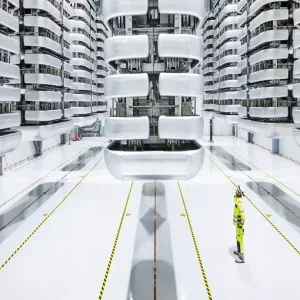The remaining 38 MW are scheduled for the completion by the end of 2009.
The project is being built on 162 hectares of land that is part of the Soviet Army’s former 26,000 hectare Lieberose training region north of Cottbus in eastern Germany. The project’s low cost enables the needed return to fund an attractive land lease for the State of Brandenburg. The lease, in turn, finances the environmental cleanup of this former military zone, which is littered with tons of land mines, grenades and other munitions.
Matthias Platzeck, minister president of the German state government of Brandenburg, where Lieberose is situated, said the project is a model for the conversion of former military land to productive use. This kind of project helps us heal the scars of the Cold War and meet our ambitious targets for renewable energy production at the same time, Platzeck said.
First Solar’s mission is to enable a world powered by clean, affordable solar electricity, said Stephan Hansen, managing director, First Solar. This project alone is expected to displace approximately 35,000 tons of C02 emissions a year. But we are particularly proud of this project because it adds an additional element to ‘clean.’ Not only will the project produce clean electricity, but it will also result in the removal of hazardous munitions from this project site.
Upon conclusion, the PV power plant will consist of about 700,000 modules and is expected to produce sufficient power to provide for the annual electricity needs of more than 14,000 homes and the second largest worldwide.
The sheer size of the project helps us achieve economies of scale that are a significant factor in helping PV energy become competitive with fossil fuels and to be able to provide an increasing contribution to national renewable energy targets, said Hansen.
Brandenburg Economics Minister Ulrich Junghanns said the project underlines the state’s credentials as an energy producer. The Lieberose project will shine far and wide and help Brandenburg solidify its top billing as a center of solar power production, he said.
Matthias Willenbacher, Juwi chief executive, said, Large projects like this one demonstrate that solar power is already capable of making significant contributions to addressing climate change.”






